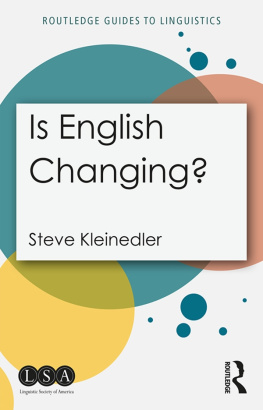Is English Changing?
Is English changing? To what degree is it changing? Is this change good or bad? In answering these questions, Is English Changing? provides a lively and concise introduction to language change, refuting commonly held misconceptions about language evolution as we understand it. Showing that English, like all living languages, has historically changed and continues to change, this book:
- analyzes developments in the lexicon, the way words are spoken or written, and the way in which speakers and writers use words;
- offers a basic overview of the major subfields of linguistics, including phonetics, morphology, syntax, semantics, pragmatics, and sociolinguistics, all viewed through the prism of language change;
- discusses change over time with examples from Old English, Middle English, and Modern English;
- reinforces important concepts with examples from other languages, including Spanish, Japanese, and Czech;
- clearly defines key terms and includes advice on rules, usage, and style, as well as ample annotated further reading and activities throughout.
Aimed at undergraduate students with little or no prior knowledge of linguistics, this book is essential reading for those studying this topic for the first time.
Steve Kleinedler is Executive Editor for the American Heritage Dictionaries.
Routledge Guides to Linguistics
Routledge Guides to Linguistics are a set of concise and accessible guidebooks that provide an overview of the fundamental principles of a subject area in a jargon-free and undaunting format. Designed for students of linguistics who are approaching a particular topic for the first time, or students who are considering studying linguistics and are eager to find out more about it, these books will both introduce the essentials of a subject and provide an ideal springboard for further study.
This series is published in conjunction with the Linguistic Society of America. Founded in 1924 to advance the scientific study of language, the LSA plays a critical role in supporting and disseminating linguistic scholarship both to professional linguists and to the general public.
Series Editor
Betty J. Birner is a Professor of Linguistics and Cognitive Science in the Department of English at Northern Illinois University.
Titles in this series:
Language in Children
Eve V. Clark
Ebonics
Sonja Lanehart
Why Study Linguistics?
Kristin Denham and Anne Lobeck
Language and Meaning
Betty J. Birner
Is English Changing?
Steve Kleinedler
Sign Languages
Diane Lillo-Martin, Sandra Wood and Joseph Hill
Bilingualism
Shahrzad Mahootian
More information about this series can be found at www.routledge.com/series/RGL
First published 2018
by Routledge
2 Park Square, Milton Park, Abingdon, Oxon OX14 4RN
and by Routledge
711 Third Avenue, New York, NY 10017
Routledge is an imprint of the Taylor & Francis Group, an informa business
2018 Steve Kleinedler
The right of Steve Kleinedler to be identified as author of this work has been asserted by him in accordance with sections 77 and 78 of the Copyright, Designs and Patents Act 1988.
All rights reserved. No part of this book may be reprinted or reproduced or utilised in any form or by any electronic, mechanical, or other means, now known or hereafter invented, including photocopying and recording, or in any information storage or retrieval system, without permission in writing from the publishers.
Trademark notice: Product or corporate names may be trademarks or registered trademarks, and are used only for identification and explanation without intent to infringe.
British Library Cataloguing-in-Publication Data
A catalogue record for this book is available from the British Library
Library of Congress Cataloging-in-Publication Data
Names: Kleinedler, Steven Racek, author.
Title: Is English changing? / Steve Kleinedler.
Description: New York, NY : Routledge, 2018. | Series:
Routledge guides to linguistics | Includes bibliographical
references and index.
Identifiers: LCCN 2017050163| ISBN 9781138234673
(hardcover : alk. paper) | ISBN 9781138234666
(softcover : alk. paper) | ISBN 9781351114073 (ebook)
Subjects: LCSH: English languageVariationHistory. |
Linguistic changeHistory. | Languages in contact
History. | Linguistic changeForecasting.
Classification: LCC PE1074.7 .K54 2018 | DDC 427dc23
LC record available at https://lccn.loc.gov/2017050163
ISBN: 978-1-138-23467-3 (hbk)
ISBN: 978-1-138-23466-6 (pbk)
ISBN: 978-1-351-11407-3 (ebk)
Typeset in Times New Roman
by Apex CoVantage, LLC
Writing this book would have been impossible without the feedback, guidance, and support of many colleagues and friends. I must acknowledge Barbara Abbott, Michael Adams, Neil Bardhan, Peter Chipman, Anne Curzan, Janet DeCesaris, Alexander Francis, Elaine Francis, Scott Golder, Sarah Grey, Joan Houston Hall, Kirk Hazen, Katherine Connor Martin, Lisa McLendon, John McWhorter, Margaret Anne Miles, Lynne Murphy, Chuck Palmer, Joseph Pickett, Dennis R. Preston, Louise E. Robbins, Amy Roeder, Jerry Sadock, Cara Schmidt, Jesse Sheidlower, Kory Stamper, Malynne Sternstein, Patrick Taylor, Bert Vaux, Josef Vvra, Lise Winer, and Ben Zimmer, as well as my editor, decades-long collaborator, and friend Betty Birner. I must also thank Lizzie Cox at Taylor & Francis and Autumn Spaulding at ApexCovantage for their hard work and attention to detail that made the publication of this book possible. Of course, any mistakes and misrepresentations are entirely my own.
Contents
Guide
Grateful acknowledgement is made to the following for permission to reprint previously published material:
- impact usage note (): Copyright 2018 by Houghton Mifflin Harcourt Publishing Company. Adapted and reproduced by permission from The American Heritage Dictionary of the English Language, Fifth Edition .
- IPA vowel chart (, available under a Creative Commons Attribution-Sharealike 3.0 Unported License. Copyright 2015 International Phonetic Association.
- Portions of are adapted from Have Your Salt and Eat It, Too, by Steve Kleinedler and are reprinted by permission of VERBATIM: The Language Quarterly .
Chapter 1
Introduction
Actually, it is easy to answer the question that the title of this book poses. Yes, the English language is changing.
You have a powerful tool for analyzing language: yourself. Take a few moments and reflect on your personal experience as a person who uses language. You should easily be able to pinpoint events from the last 15 years of your life that reflect change in the English language (and in any other language you might speak in addition to English).
Now, lets step back a little further in time.
- In the 1950s and 1960s, the Cold War escalated between the United States and the Soviet Union and their respective spheres of influence. Both countries wanted to be the first to land a spacecraft on the moon. This space race led to increased interest in astronomy and physics across all levels of education and in the popular culture.
- In the 1970s and 1980s, the processing power of computers expanded exponentially. Completely new occupations that involved computer technology developed, including programming and data analysis. The use of computers to streamline business operations began to affect the way people dealt with hospitals, banks, educational institutions, and government agencies.











